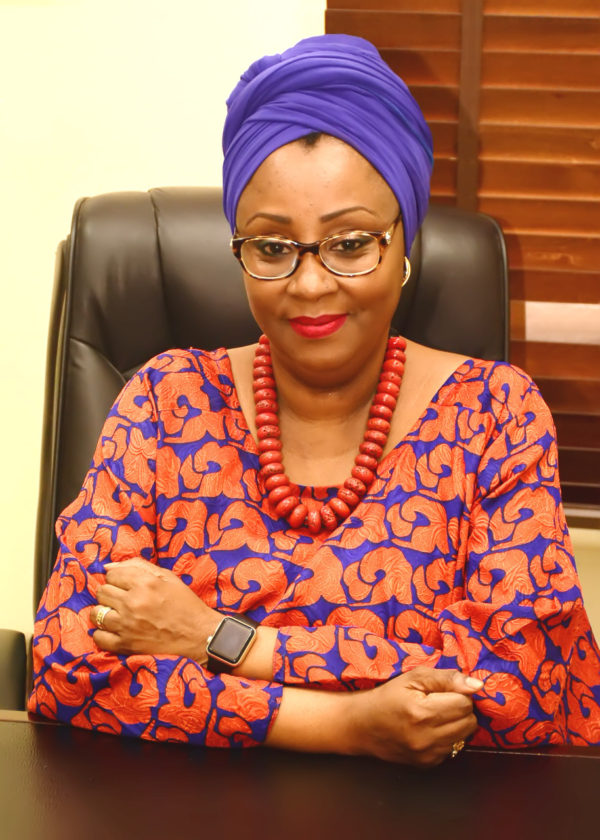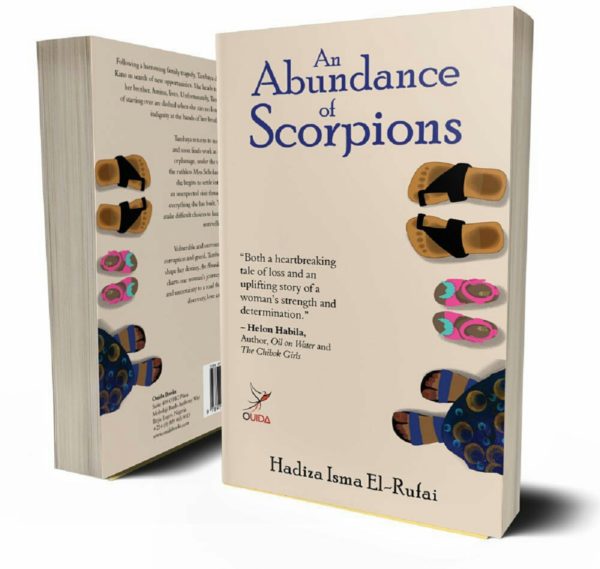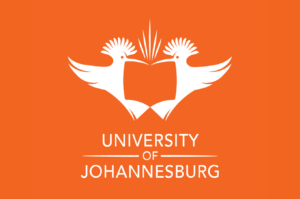
Hadiza El-Rufai, founder of the Yasmin El-Rufai Foundation, debuted a novel this year, An Abundance of Scorpions, for which she recently went on a book tour in Lagos. An Abundance of Scorpions is published by Ouida Books and has been described by The Guardian Nigeria as “a heart-rending and riveting story of a woman in her quest for love, peace and happiness.” It comes with a blurb from Helon Habila: “Both a heartbreaking tale of loss and an uplifting story of a woman’s strength and determination.”
Here is a synopsis of the novel:
Following a horrific tragedy, Tambaya leaves Kano for Accra to live with her brother, Aminu. Sadly, her dream of a new beginning is dashed when she can no longer endure the indignity she suffers at the hands of her brother’s new wife.
Tambaya returns to northern Nigeria and soon finds work as a matron in an orphanage, under the watchful eye of the ruthless Miss Scholastica. Just when she begins to settle into her new life, an unexpected visit threatens to destroy everything she has worked so hard to build. Tambaya faces moral dilemmas on all sides, but she must stop her life from unraveling once again.
Vulnerable, and surrounded by malice, corruption and greed, Tambaya struggles to shape her destiny. An Abundance of Scorpions charts one woman’s journey through grief and uncertainty to a road that leads to self-discovery, redemption and love.
Born in Kano, Hadiza Isma El-Rufai holds BSc and MSc degrees in Architecture from Ahmadu Bello University, Zaria, Nigeria, and an MBA degree from the same university. She also has an MA in Creative Writing from Bath Spa University, Bath, UK.
Here she is interviewed by Deaduramilade Tawak.

Interviewer:
I read some of your previous interviews about how reading is, for you, a way to transport yourself for a while out of whatever you were in at the moment. Was that something you thought about when you were writing An Abundance of Scorpions? Is that what you were trying to achieve?
Hadiza El-Rufai:
I guess you can say that but it wasn’t quite the motivation for writing the book. It’s just that that’s how I feel about reading, that’s what it does to me, and if my book were to help someone in that way, I’d be very happy.
Interviewer:
Does that mean escapist literature is important to you?
Hadiza El-Rufai:
I guess so. Life is not easy. So whatever we need to help ourselves should be encouraged.
Interviewer:
The book is set in the ‘90s. Why did you choose this period? Could it have been set in any other time period?
Hadiza El-Rufai:
I could have set it in a period that’s further back because I already have in mind a story that I will tell but is in the future. So, if I had set it in, for instance, 2017, then the next one that I’m writing to be set in the future would not be realistic because it would be like something futuristic, so I had to set it a little further back to enable me write the second story in reality.
Interviewer:
Is the second one a continuation of An Abundance of Scorpions?
Hadiza El-Rufai:
Yes. More or less.
Interviewer:
Something interesting about the book is that the main character is an older adult, a Muslim, Hausa woman living in the North. A lot of contemporary Nigerian literature in English is told from the perspective of a young person usually from the East or the West. You yourself are a Muslim and an older adult and Hausa woman. Is there a link here? Writing what you know?
Hadiza El-Rufai:
The book I started writing was about a young person. An orphan boy. This one I’ve written came as a result of a back story to that story, and the person happened to be an older person so I didn’t set out particularly to write about an older person. In fact, when I started writing, it was to write about a really young person.
Interviewer:
So the next one will be about a young person?
Hadiza El-Rufai:
Yes.
Interviewer:
I know you’ve been asked whether the book is about you a lot and I wasn’t going to ask, but people tend to want to draw parallels between a novel and what happens in the author’s life. What I want to talk about relating to that is that there are things about you and the main character that are similar. One of the characters had seizures. Was it difficult for you to write about that? And how difficult was it?
Hadiza El-Rufai:
There are certain parts that were a bit difficult to write because I started writing the story when my daughter was alive. I even wrote the part about the boy that had the seizure when she was alive. I guess I wanted to highlight that because my daughter suffered seizures and that’s even what killed her. It’s not just about seizures. I have family members that are sicklers. In a way, it’s like paying tribute to them.
Interviewer:
Would you say it helped you in your grieving?
Hadiza El-Rufai:
I wouldn’t say so. I wrote that part before she died.
Interviewer:
I know you’ve talked about identity and chance and religion as themes in the book. And the book covers more: religious intolerance, corruption, infertility, postpartum depression, poor healthcare, and more. But reading it also felt like it was somebody’s diary. It felt like you saying: This is my life. This is what is happening at this point in my life. That’s how intimate it felt. So did you write about all these issues to make people think about them? Was it a combination of the two? Or did you only want people to ponder on the issues? Are they things that came up as a result of how this person has lived, how these are the things that happened along the way?
Hadiza El-Rufai:
These are things I want people to ponder about. I think if a writer were honest, they have to admit that sometimes you write because you want people to think about certain things. You don’t want to say this is good; you don’t want to say this is bad. You just put it out there for people to read and think about. I like to write things that would make people think when they read them.
Interviewer:
Can you talk about some particular issues you wanted people to pay attention to?
Hadiza El-Rufai:
Particularly, I think when it comes to religion, it’s religious intolerance. Basically, I guess what I’m trying to say is that people should take it easy, religion is personal, and we should be more tolerant.
Interviewer:
It was interesting to read about how orphanages are run and the process of adoption. It’s not something that I have ever thought about in Nigeria. How did you research that part of the book? What else did you research?
Hadiza El-Rufai:
I didn’t really have to research the orphanage and adoption process because I had worked closely with an orphanage in Abuja. When my husband and I were living in Abuja, I used to go often to the Abuja Children’s Home and I was sort of involved with the orphanage. I knew how they do these things and, basically, what I’ve written about that is real. You know, all this rivalry. When you find a child, you don’t know who he is and you know how we are in Nigeria. I didn’t really need to do much research because I knew a lot of it.
Interviewer:
Was there anything you had to research for the book?
Hadiza El-Rufai:
Mainly the part I wrote about Accra. I had to do research because I was writing about the part of Accra where Hausa people lived. You know you can’t write and describe places you’ve not been to without research. I guess some people can, but it’s better to go so I went there to do research. I was in Accra for about two weeks and visited the quarters just to get a feel of it. I’m glad that I did because, actually, the mental picture I had was different.
Interviewer:
What was different from what you expected and what you saw?
Hadiza El-Rufai:
One major thing was different. Maybe because we have lots of plastic bags hanging around in Nigeria, I just assumed I’d see them all over. I mean, it wasn’t that clean but it wasn’t about plastic bags. Sometimes here in Nigeria, we see too many plastic bags. They have their own kind of dirt. I had written a bit about that where I said there are plastic bags everywhere so I had to remove that part because there are none.
Interviewer:
In the description of the book, there’s a note on moral dilemma and in the book, in how the conflict is resolved between Ms Scholastica and Tambaya, there’s focus on how morality is constructed. Does the resolution reflect your views on morality?
Hadiza El-Rufai:
Basically, what I’m trying to say is that sometimes one has good principles but you might find yourself in a situation where you have to bend a little. She is in a very bad situation, she needs to remain there for her nephew’s sake, and she feels that she can control the situation by just turning a blind eye to what Mrs Scholastica is doing, but with giving her certain conditions that she must comply with. I think that was okay for her conscience. A lot of the time, we’re not perfect human beings.
Interviewer:
My last question. A part of An Abundance of Scorpions pokes fun at First Ladies, and being a First Lady yourself, is it something to just have fun with in the process of writing the book?
Hadiza El-Rufai:
Yes. I was just having fun with that but I’m sure you know that some of the things I wrote are true. I just felt it was something that would make people laugh.
About the Interviewer:
Deaduramilade Tawak is a reader, writer, and psychology grad, who moonlights as a UX researcher. Her flash fiction, essays, interviews, and reviews have been published in Brittle Paper, Athena Talks, Africa in Dialogue, and Arts and Africa. She lives in Lagos and tweets from @deaduramilade.









The Full Story: Former Deputy Editor, Otosirieze Obi-Young and Brittle Paper Founder, Ainehi Edoro Are Locked In A Threatical War - Creative Writing News April 17, 2020 08:10
[…] that Mrs. Hadiza El-Rufai is a novelist, that she has been featured on Brittle Paper, an interview by Deaduramilade Tawak, and also the fact that Brittle Paper was described by its […]